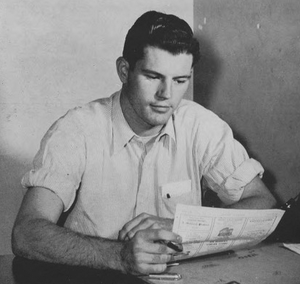Wendell Bell facts for kids
Wendell Bell (born September 27, 1924 – died November 3, 2019) was a smart thinker who studied the future. He was also a professor of Sociology (the study of how people live together in groups) at Yale University. He was very interested in how societies work, including things like different social groups, race, family life, and what might happen in the future.
Contents
Early Life and Studies
During World War II, Wendell Bell was a pilot for the United States Navy. He served in the Philippines during the war.
After the war, Bell went to college. He earned his first degree in Social Sciences from California State University, Fresno in 1948. He then continued his studies and received his Ph.D. (a very high degree) from UCLA in 1952.
After getting his Ph.D., Bell taught at several well-known universities:
- Stanford University (from 1952 to 1954)
- Northwestern University (from 1954 to 1957)
- UCLA again (from 1957 to 1963)
While at UCLA, he led a special program that studied the Caribbean islands. From 1963 to 1964, he was a special researcher at a place called the Center for Advanced Study in the Behavioral Sciences in Stanford, California.
Working at Yale University
In 1963, Wendell Bell joined the team at Yale University. He became the head of Yale's Sociology Department. He also helped start the Yale Program of African American Studies, which focuses on the history and culture of African Americans. He worked at Yale until he retired in 1995.
Studying the Future: A Futurist's Work
Wendell Bell is best known for his work as a futurist. A futurist is someone who studies trends and patterns to make educated guesses about what the future might be like. Bell worked as a professional futurist for more than 40 years.
His work helped people think about:
- How societies might change
- What new technologies could appear
- How people's lives might be different in the years to come
Recognitions for His Work
Because of his important work, Bell received several awards:
- In 2005, the World Futures Studies Federation gave him a Lifetime Achievement Award. This award recognized his many years of dedication to studying the future.
- In 2008, a group called the Association of Professional Futurists chose his two-volume book, The Foundations of Futures Studies, as one of the ten most important books in the field of futures studies.
 | Anna J. Cooper |
 | Mary McLeod Bethune |
 | Lillie Mae Bradford |


